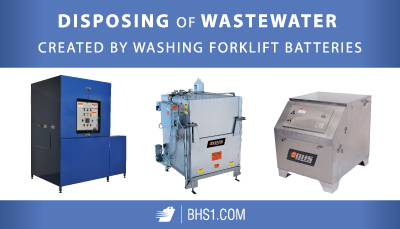We use cookies to make your experience better. To comply with the new e-Privacy directive, we need to ask for your consent to set the cookies. Learn more.
Disposing of Wastewater Created by Washing Forklift Batteries
Maintaining a well-functioning lift-truck fleet requires washing batteries, and that process creates wastewater. The EPA classifies this dirty water as hazardous waste, and as such, it requires careful attention.
Businesses in many other industries, such as metalworking and metal fabrication, die casting, truck wash centers, and more fall into the same boat. When operations create wastewater, they have three basic options.
-
Pay a third-party provider to clean and dispose water.
-
Invest in an on-site wastewater cleaner.
-
Illegally dump wastewater into the sewer.
The ethical and legal implications of the third choice make it a non-starter. Pollutants in battery wastewater include lead, copper, and other heavy metals that can contaminate drinking water and create a health risk for local residents. Other industries can create even more toxic waste that must be treated to keep our water supply safe.
If that angle isn't undesirable enough, the legal ramifications ought to scare anyone in charge of wastewater disposal. Of course, the EPA can levy huge fines, which can sink a business. But federal regulators can also charge managers with criminal offenses for improper wastewater management. These offenses carry sentences of up to five years in prison!
Given the above reasons, finding a safe and compliant way to dispose of wastewater is the only option.

So how do managers choose between outsourced and on-site wastewater disposal? As with any equipment or service purchase, the decision comes down to the budget. Smaller operations that slowly accumulate waste water may find that paying a service provider to haul it away is the most feasible option.
For businesses dealing with wastewater from battery washing, a Recirculation / Neutralization System can reduce the volume of contaminated water they accrue. These systems create a closed loop with Battery Wash Cabinets to make washing batteries almost entirely automated.
These sophisticated recirculation machines also clean and recirculate wastewater, allowing it to be used repeatedly. This reduces the amount of dirty water that must be sent out for treatment. However, operators must eventually flush the system, and that results in wastewater that must be treated before going down the drain.
There is another option that creates a closed loop with Battery Wash Cabinets.
Wastewater Recycling Systems (WRS) treat water so it can go back to the wash cabinet or down the drain, where it poses no health risk to citizens (and no legal risk to business owners). This automated, single-structure recycling system treats water at two gallons per minute, which makes the entire process fast and easy.
In fact, some businesses find the WRS so efficient and easy to operate that they offer water treatment as a service to other businesses to improve their return on investment. With audible and visual alarms to alert staff when attention is needed, these machines need minimal oversight as they perform this valuable service.
As the WRS cleans wastewater, it captures dangerous particles and dries them into a hardened, non-toxic byproduct. Here are a few more benefits of a Wastewater Recycling System:
-
The WRS automates battery washing and wastewater disposal.
-
Independent lab testing (which is included with a WRS purchase) guarantees that treated water and byproduct comply with all federal and local regulations.
-
The unit alarms will alert staff when the system needs attention, which allows the system to run with minimal supervision.
-
Treat wastewater from many different industries including general manufacturing, painting, plating, and more.
Investing in a Wastewater Recycling System is a big decision. However, it's one that provides a great number of benefits. Managers can have peace of mind that their operations comply with legal regulations and don't harm the environment or the drinking water.
On top of that, managers can rely on BHS' heavy-duty, state-of-the-art equipment that efficiently cleans massive amounts of wastewater with little maintenance or oversight. The ability to treat and dispose of wastewater on-site simplifies life for everyone, and it can even open new revenue streams for those who want to offer wastewater treatment as a service.
References:
Condon, Clare. “7 RCRA Violations That Will Send You to Jail.” EHSDailyAdvisor. BLR, 3 August 2012. Web. 26 Oct. 2017.
Esworthy, Robert. “Federal Pollution Control Laws: How Are They Enforced?” FAS. Congressional Research Service, 7 Oct. 2014. PDF. 26 Oct. 2017.
“Hazardous Waste – RCRA Subtitle C.” EPA. U.S. Environmental Protection Agency, n.d. Web. 28 Oct. 2017.
